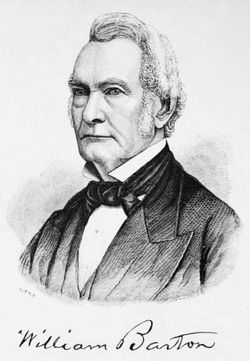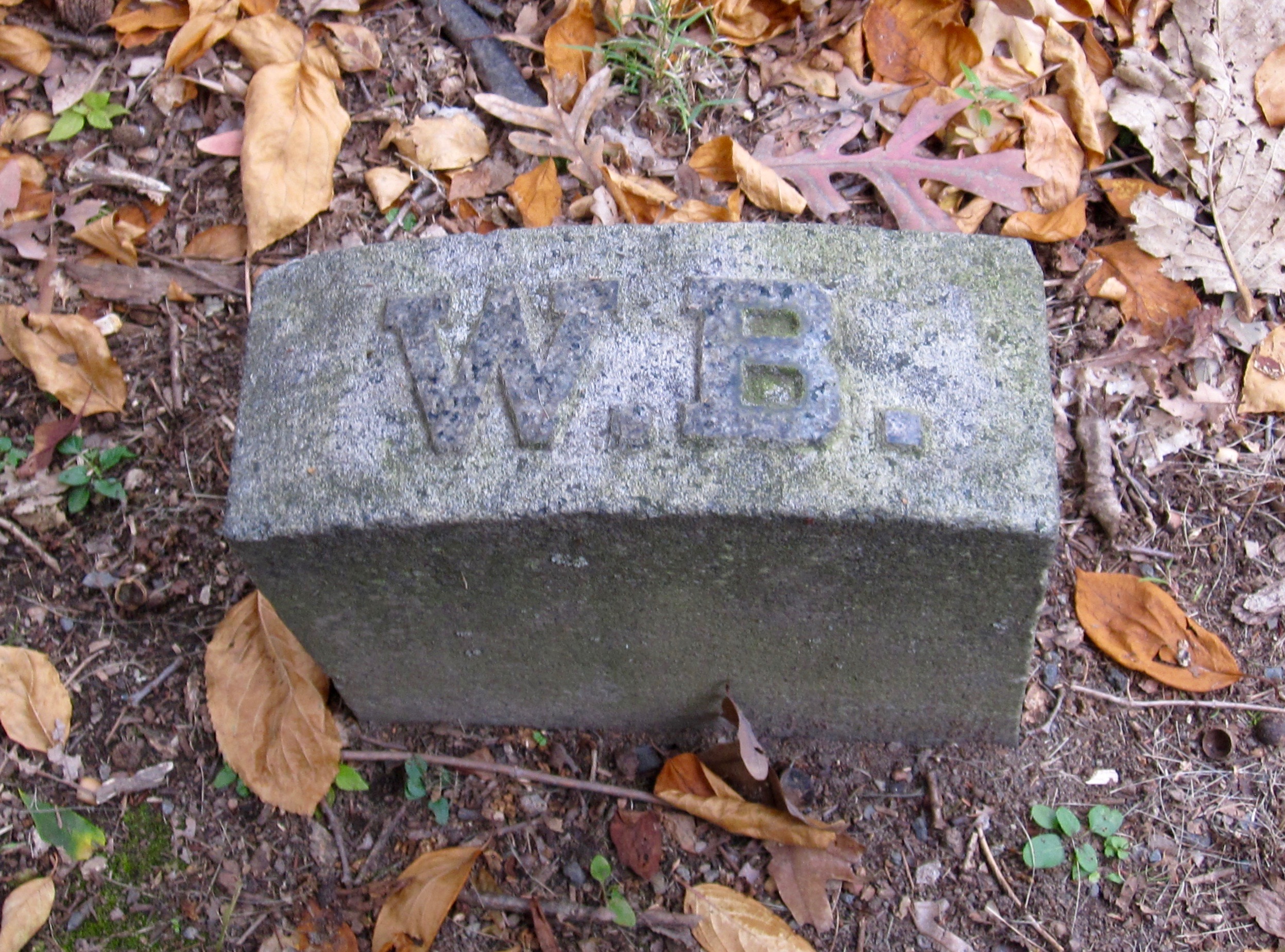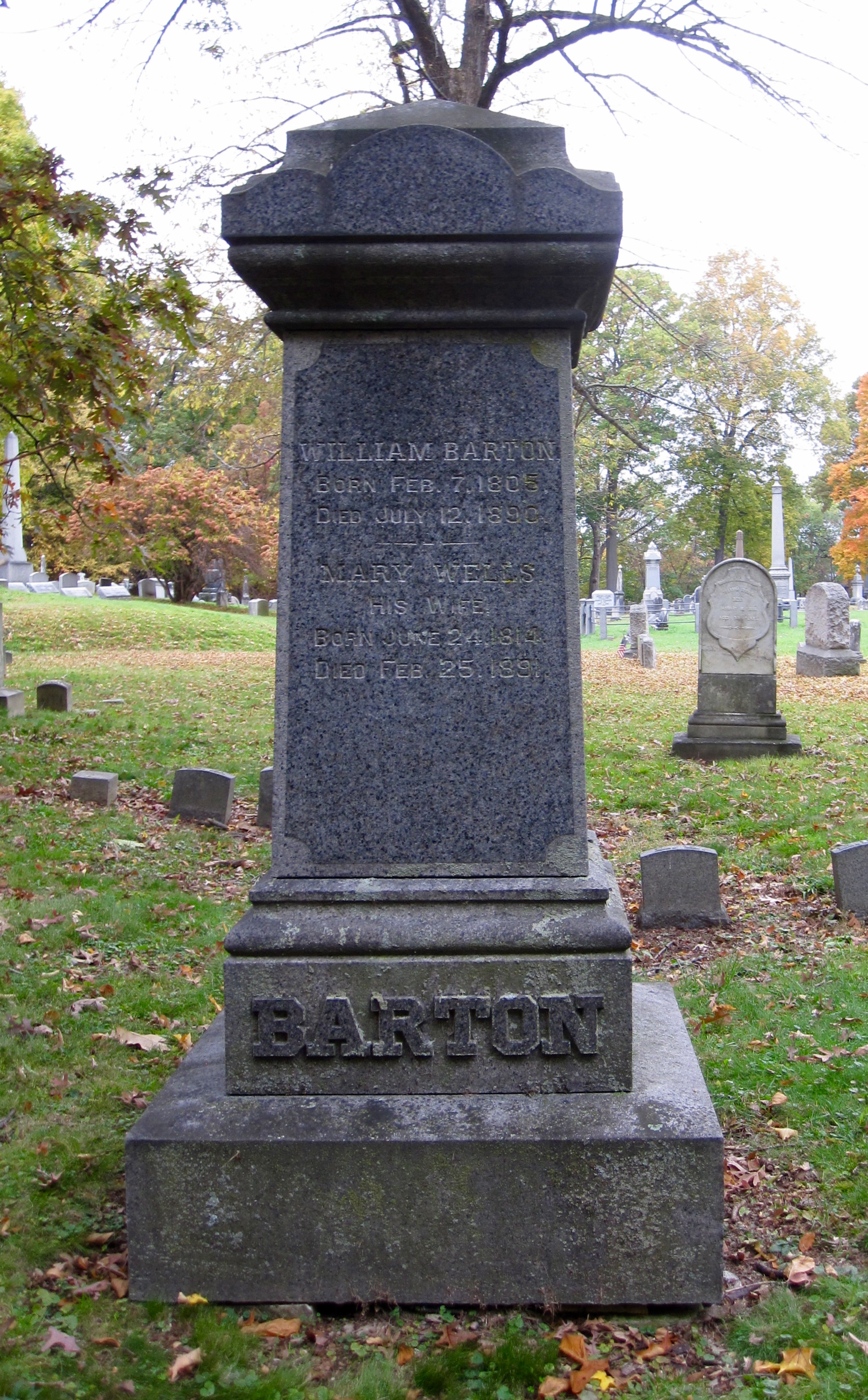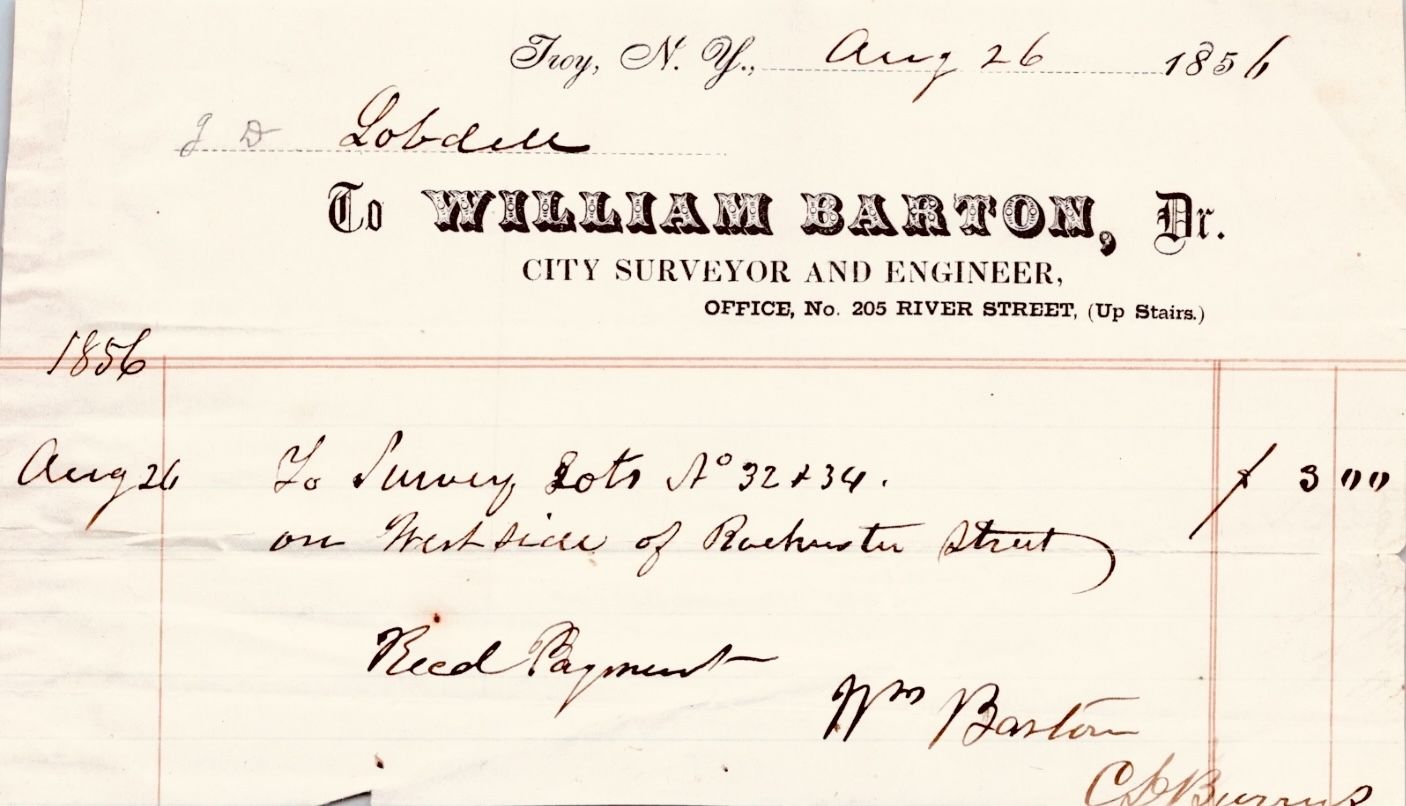--------------------
THE DAILY TIMES, TROY, N. Y., SATURDAY AFTERNOON, JULY 12, 1890, PAGE E, COLUMN 3
Death of Troy’s Oldest Native-Born Citizen – Sketch of the Career of an Honored Resident
The community will be pained to learn of the death of William Barton, one of Troy’s oldest and best citizens. He died this morning at his residence, No. 2, 224 Fifth avenue, after a long illness.
William Barton was a native of this city and was born February 7, 1805. He was a son of Robert and Mary (Carpenter) Barton, who removed to Troy in 1803. His father was a native of Dutchess county and his mother was born in Ulster county, in this state. They were both members of the Society of Friends. Robert Barton will be remembered by Troy’s older citizens as a successful business man. He was at first a fanning mill maker, then in the grocery business and subsequently in the manufacture of soap and candles. He was identified with various enterprises in the early history of Troy, in which city he died in 1836 at the age of fifty-nine years. His wife died in 1866 at the age of eighty-six years.
William Barton was born in a wooden dwelling still standing on River street, below Ferry. In this house Charles Crocker, the California millionaire, first saw the light. At the time of Mr. Barton’s birth Troy was a village. It was eleven years before the incorporation of the city. He was educated at the Friends’ school at Nine Partners, Dutchess county, and was for many years in business with his father in Troy. He studied civil engineering with Amos Eaton and others, and in 1832 he accepted a position as assistant engineer for the macadamized road then building between Troy and Bennington. In 1833-34 he was assistant engineer of the Rensselaer and Saratoga railroad, and in the construction of the railroad bridge over the Hudson at Troy. He surveyed the line of the Boston and Albany railroad in1836 and 1839. He subsequently was a contractor for that road, and built sections of the road and the wharves and depot buildings at East Albany. His favorite project, and one which he inaugurated and successfully carried out, was the building of the Troy and Lansingburgh railroad in 1860-’61. He was the first engineer, and subsequently superintendent of that road until 1867. He not only engineered the road, made the surveys and supervised the construction, but he was the inspiring spirit in the matter of securing subscriptions. After retiring from the railroad of which he was the managing director, Mr. Barton was engaged in the coal business for several years with John H. Tupper. Mr. Barton’s connection with the Troy and Lansingburgh railroad extended to the Cohoes road as well, and he was a director in both roads for many years.
In 1839 Mr. Barton was appointed city surveyor, a position which he held almost continuously for twenty years. In 1858 he made the first complete map of the city. He was also engineer for the extension of the wharves along the city front.
In the days of the hand fire-engines Mr. Barton took an active part. He was foreman of old No. 4, and he was one of the organizers of the Arba Read steamer company and the first president of the organization.
In politics Mr. Barton was originally a Whig, and he became a Republican on the organization of that party. In 1847-8 he represented the seventh ward in the board of alderman. He was faithful and zealous in every trust reposed in him, and he took an active part in all enterprises for the development of the prosperity of the city.
Mr. Barton married in May, 1839, Miss Mary A. Wells of Springfield, Mass., a sister of Hon. David A. Wells of Norwich, Conn. They never had any children. Mrs. Barton survives, but she is an invalid.
In 1836 Mr. Barton, who had grown up under the influence of Quaker parents, became a Unitarian, and he was one of the founders of the Unitarian church in this city. He was faithful in church attendance, and ever ready to aid by his means and influence any worthy enterprise. He was a man of generous impulses. He was kind to all – he had a large heart and was glad to contribute to enable others to enjoy the blessings of this life. His public and private life was without blemish, and he was honored and loved by a large circle. He possessed in a marked degree the assurance that whatever he undertook – backed by honest purpose and Trojan persistence – would succeed. His death closes the career of a good man – a citizen who had done much for the benefit of his native city.
…Mr. Barton had long been a sufferer from rheumatism, and that with other complications caused his death. The funeral will take place Monday afternoon at 4 o’clock from the Unitarian church.
------------
Thanks to Danielle for the photos and the plot info.
--------------------
THE DAILY TIMES, TROY, N. Y., SATURDAY AFTERNOON, JULY 12, 1890, PAGE E, COLUMN 3
Death of Troy’s Oldest Native-Born Citizen – Sketch of the Career of an Honored Resident
The community will be pained to learn of the death of William Barton, one of Troy’s oldest and best citizens. He died this morning at his residence, No. 2, 224 Fifth avenue, after a long illness.
William Barton was a native of this city and was born February 7, 1805. He was a son of Robert and Mary (Carpenter) Barton, who removed to Troy in 1803. His father was a native of Dutchess county and his mother was born in Ulster county, in this state. They were both members of the Society of Friends. Robert Barton will be remembered by Troy’s older citizens as a successful business man. He was at first a fanning mill maker, then in the grocery business and subsequently in the manufacture of soap and candles. He was identified with various enterprises in the early history of Troy, in which city he died in 1836 at the age of fifty-nine years. His wife died in 1866 at the age of eighty-six years.
William Barton was born in a wooden dwelling still standing on River street, below Ferry. In this house Charles Crocker, the California millionaire, first saw the light. At the time of Mr. Barton’s birth Troy was a village. It was eleven years before the incorporation of the city. He was educated at the Friends’ school at Nine Partners, Dutchess county, and was for many years in business with his father in Troy. He studied civil engineering with Amos Eaton and others, and in 1832 he accepted a position as assistant engineer for the macadamized road then building between Troy and Bennington. In 1833-34 he was assistant engineer of the Rensselaer and Saratoga railroad, and in the construction of the railroad bridge over the Hudson at Troy. He surveyed the line of the Boston and Albany railroad in1836 and 1839. He subsequently was a contractor for that road, and built sections of the road and the wharves and depot buildings at East Albany. His favorite project, and one which he inaugurated and successfully carried out, was the building of the Troy and Lansingburgh railroad in 1860-’61. He was the first engineer, and subsequently superintendent of that road until 1867. He not only engineered the road, made the surveys and supervised the construction, but he was the inspiring spirit in the matter of securing subscriptions. After retiring from the railroad of which he was the managing director, Mr. Barton was engaged in the coal business for several years with John H. Tupper. Mr. Barton’s connection with the Troy and Lansingburgh railroad extended to the Cohoes road as well, and he was a director in both roads for many years.
In 1839 Mr. Barton was appointed city surveyor, a position which he held almost continuously for twenty years. In 1858 he made the first complete map of the city. He was also engineer for the extension of the wharves along the city front.
In the days of the hand fire-engines Mr. Barton took an active part. He was foreman of old No. 4, and he was one of the organizers of the Arba Read steamer company and the first president of the organization.
In politics Mr. Barton was originally a Whig, and he became a Republican on the organization of that party. In 1847-8 he represented the seventh ward in the board of alderman. He was faithful and zealous in every trust reposed in him, and he took an active part in all enterprises for the development of the prosperity of the city.
Mr. Barton married in May, 1839, Miss Mary A. Wells of Springfield, Mass., a sister of Hon. David A. Wells of Norwich, Conn. They never had any children. Mrs. Barton survives, but she is an invalid.
In 1836 Mr. Barton, who had grown up under the influence of Quaker parents, became a Unitarian, and he was one of the founders of the Unitarian church in this city. He was faithful in church attendance, and ever ready to aid by his means and influence any worthy enterprise. He was a man of generous impulses. He was kind to all – he had a large heart and was glad to contribute to enable others to enjoy the blessings of this life. His public and private life was without blemish, and he was honored and loved by a large circle. He possessed in a marked degree the assurance that whatever he undertook – backed by honest purpose and Trojan persistence – would succeed. His death closes the career of a good man – a citizen who had done much for the benefit of his native city.
…Mr. Barton had long been a sufferer from rheumatism, and that with other complications caused his death. The funeral will take place Monday afternoon at 4 o’clock from the Unitarian church.
------------
Thanks to Danielle for the photos and the plot info.
Family Members
Advertisement
Explore more
Sponsored by Ancestry
Advertisement








